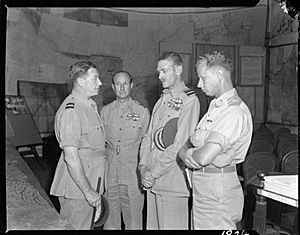Alick Stevens facts for kids
Quick facts for kids
Sir Alick Stevens
|
|
|---|---|

Air Vice Marshal Stevens with senior officers in the War Room at Headquarters Strategic Air Force, Eastern Air Command in Calcutta
|
|
| Born | 31 July 1898 |
| Died | 2 July 1987 (aged 88) |
| Allegiance | United Kingdom |
| Service/ |
Royal Navy (1916–18) Royal Air Force (1918–53) |
| Years of service | 1916–53 |
| Rank | Air Marshal |
| Commands held | Coastal Command (1951–53) RAF East Africa (1950) British Forces Aden (1948–50) No. 22 Group (1946–48) No. 4 Group (1945–46) No. 47 Group (1945) RAF Gibraltar (1944–45) No. 205 Squadron (1936–37) |
| Battles/wars | First World War Second World War |
| Awards | Knight Commander of the Order of the British Empire Companion of the Order of the Bath Mentioned in Despatches |
Air Marshal Sir Alick Charles Stevens (31 July 1898 – 2 July 1987) was a very important officer in the Royal Air Force (RAF). He rose to a high rank, becoming an Air Marshal. His most significant role was leading the RAF Coastal Command from 1951 until he retired in 1953.
RAF Career
Sir Alick went to Victoria College, Jersey for his education. In 1916, he joined the Royal Naval Air Service. This was a part of the navy that used aircraft.
He fought in the First World War. In November 1916, his plane had engine trouble, and he had to land in the Thames Estuary. A German submarine (U-Boat) found him and took him as a prisoner of war. He spent the rest of the war in Osnabrück, Germany.
In 1935, he became the leader of No. 205 Squadron RAF. He also served in the Second World War. During this time, he helped plan air operations that worked with the navy.
By 1943, he was a senior officer at the headquarters of No. 18 Group RAF. This group focused on reconnaissance, which means gathering information by observing. In 1944, he was put in charge of RAF Gibraltar.
After the Second World War, Sir Alick held several important leadership roles. He commanded No. 47 Group RAF, then No. 4 Group RAF, and later No. 22 Group RAF.
In 1948, he became the Commander of British Forces Aden. He then led the RAF in East Africa. In 1950, he became a senior staff officer at the headquarters of RAF Coastal Command. Finally, in 1951, he became the top commander of RAF Coastal Command before retiring in 1953.

